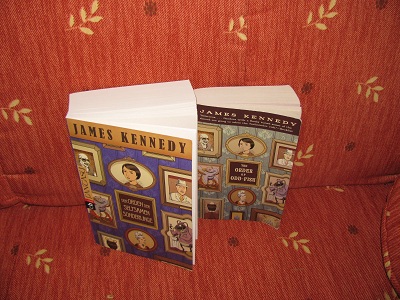Happy Sonderling Sunday! Alles Gute zum Muttertag!
I want to point out that Sonderling Sunday is not necessarily for people who speak German. It’s for nerdy types (Sonderlinge) who enjoy playing with language, who enjoy looking at concepts from a new perspective (such as “knew by heart” translated as “knew like her own vest pocket”), or who enjoy the sounds of words (such as “Balderdash!” translated as Papperlapapp!).
For Sonderling Sunday, I use Der Orden der Seltsamen Sonderlinge, the German translation of James Kennedy’s The Order of Odd-Fish as a source for learning all the things you never knew you wanted to be able to say in German.
We’re on Chapter Five. This begins on page 48 of the English version, and Seite 65 auf Deutsch.
I’ll start with the opening (two) paragraphs:
But who is Ken Kiang?
Let us rewind to several years ago. Imagine a room — a large room, the size of a theater or cathedral. The room is almost empty, the walls bare, the floor nearly deserted.
This is translated as:
Wer ist nun Ken Kiang?
Gehen wir einige Jahre zurück. Stellen wir uns einen Raum vor, einen gro?en Raum etwa von der Grö?e eines Theaters oder einer Kathedrale. Der Raum is fast leer, die Wände sind nackt und es steht so gut wie nichts auf dem Boden.
There aren’t really new words in that section for me. The only thing I find particularly interesting is that the word translated from “bare,” is nackt, which I thought meant “naked.” And yes, that is the same meaning, but in English we tend to use naked more often for people and “bare” for things like walls. I would venture to guess that we got our English word “naked” from this source.
Going on, let’s look for some more interesting translations. In fact, a paragraph a little ways down the page has much more potential.
It is a small, wind-up brass donkey. Ken Kiang watches it trudge across his desk. The donkey is a medieval Arabic automaton he unearthed at a recent archaeological dig in Syria. He wants to be impressed by its unique workmanship. He longs to glory in its exquisite detail. He aches to be fascinated by its stunning ingenuity.
It bores him.
Auf Deutsch:
Es ist ein kleiner Blechesel zum Aufziehen. Ken Kiang sieht zu, wie er über seinen Schreibtisch hoppelt. Der Esel ist ein mittelalterlicher arabischer Automat, den er bei einer archäologischen Ausgrabung in Syrien kürzlich gefunden hat. Er würde sich gerne von der einzigartigen Handwerkskunst beeindrucken lassen, sehnt sich danach, sich in den wundervollen Einzelheiten zu verlieren. Er wünscht sich beinahe schmerzhaft, von der verblüffenden Genialität dieses Apparates fasziniert zu sein.
Er langweilt ihn.
Here we have:
“brass donkey” = Blechesel
“trudge” = hoppelt (I suspect it’s really saying the brass donkey hopped across the desk.)
I still enjoy that “impressed” goes back to the same roots in German. I know this because on the computer printing out something in English is ausdrucken in German. And the translation for “impressed” is beeindrucken. I think that’s sort of like “imprinted,” which you have to admit is in the word “impressed” when you really look at it.
“stunning ingenuity” = verblüffenden Genialität
Onward! Some more interesting words and phrases:
“weary” = überdrüssig
“most rare” = seltensten (This clearly has the same root as in the word “Odd” = seltsamen
“experiences” = Erfahrungen (This has fahr, the root for “travel” in it.)
“connoisseur’s instinct” = Genie?erinstinkte
“homeless shelter” = Obdachlosenunterkunft (literally, something like “whether-roofless-accommodation” and “accommodation” is literally “under future.”)
“verve” = Schwung (Google translates this “momentum.”)
“showmanship” = Publikumswirksamkeit (I’m going to start looking for the longest word in each section. So far, Obdachlosenunterkunft has it by one letter.)
“charities” = Mildtätigkeit (Hmm. Google just translates this as “mild activites”)
“more obscure crusades” = düstereren Kreuzzügen (literally, “darker cross trains”)
“ambitious” = ehrgeiziges (literally “honor stingy”)
“baffled needy” = verblüfften Bedürftigen
“laurels” = Lorbeeren
An even longer word!:
charity programs = Wohltätigkeitsprogramme
“standard for excellence” = Ma?stäbe (The German is shorter than the English! Literally, this is “measure-bars”)
Here’s a good one!
“when inspiration struck” = als ihn die Muse küsste (“when the muse kissed him.”)
“clods” = Schwachköpfe (“weakheads”)
“dabbled” = dilettierte
“itched” = juckte
“use it to great effect” = wirkungsvoll in Szene zu setzen (“effectively set the scene”)
That’s it for Chapter 5!
Longest word of the day: Wohltätigkeitsprogramme
Most fun figure of speech: als ihn die Muse küsste
Best insult: Schwachköpfe
Most fun to say: verblüfften Bedürftigen
Tune in next week, when Jo, Aunt Lily, Colonel Korsakov, and Sefino flee from the evil Ken Kiang!
